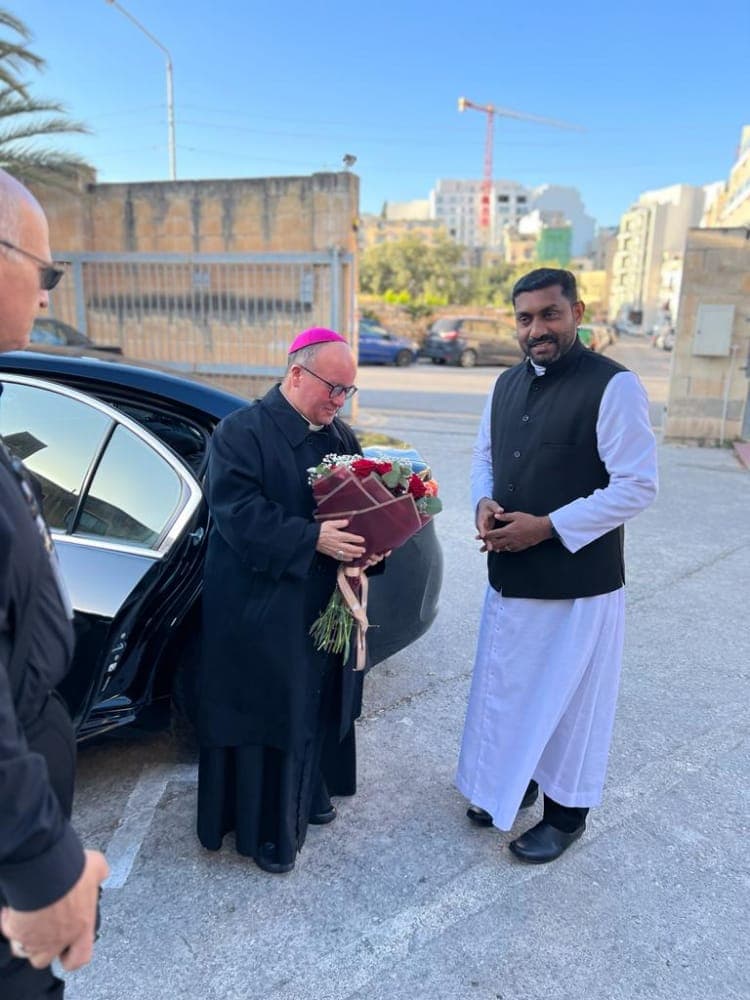MUMBAI – Archbishop Charles Scicluna of Malta, a former top Vatican prosecutor and considered one of Catholicism’s leading reformers on clerical sexual abuse, found himself apologizing for another form of mistreatment in late April.
The Maltese prelate asked forgiveness of members of Malta’s small Indian community for occasions when they did not receive the “dignity, respect, love and compassion” they deserved, a Maltese news agency reports.
Scicluna was speaking during an April 22 dinner organized by Malta’s Syro-Malabar Catholics, part of a retreat staged in the auditorium of St. Monica’s school. The Syro-Malabar church, centered in India, is one of 23 eastern churches in communion with Rome.
According to Maltese government statistics, there are roughly 5,000 Indians living on the island nation, representing around 0.5 percent of the population.
Though small in size, Malta’s Indian minority has long complained of mistreatment and a sense of second-class citizenship. Last year, the country’s food delivery personnel, a job where Indians tend to be over-represented, conducted a national strike complaining of wage discrimination.
“In the name of the Church in Malta I would like to say to each one of you: You are welcome. Thank you for being here among us with a witness of a huge sense of duty, dedication to work and family, but also a great witness to faith,” Scicluna told the community.
He recalled that many parish priests spoke fondly about the Indian Christians who found time to visit churches to pray and who “bear witness to a faith that is devout, heart-warming and sincere.”
Scicluna nevertheless recognized that warm welcome the Church in Malta extends to the country’s Indian Christians was not always necessarily echoed by the Maltese themselves.
“You have come to know our society, which has its benefits but also its deficits. Sometimes we say that we are a welcoming society, but you know at times you don’t feel as welcome as you should be,” he said.
“So I would like to ask you forgiveness for every time that you meet a Maltese Christian and you don’t feel treated with dignity, with respect, with love and compassion,” Scicluna said.
Scicluna thanked the community for its dedicated service in many walks of life, describing their contribution to society as one that was essential and that was set to become more important in the coming years.
The archbishop urged the community – which, he noted, belonged “to a very ancient truth of faith and fidelity” – to never forget its roots and to be proud of its heritage.
“Be convinced that you have something beautiful you can share with us and pray that we, natives of these islands, are humble enough and wise enough to understand that through respect and communion we are not poorer but richer,” he said.
Scicluna then asked community for its intercession, urging it to pray “that we remain what Paul the apostle found in 60 A.D.: A community of men and women who had huge hearts and saw people needing help and they did not shy away from lending a helping hand,” a safe haven for everyone and a community that cherishes family life.
He urged the community to pray so that the young living in Malta may feel accepted wherever they may come from, and asked for a special prayer that Malta “may always remain safe for babies in their mother’s womb,” as he once more thanked the members of the community who worked in the care professions.
As he concluded his address, Scicluna said that his last prayer was that “you may be always friends of each other and willing to support each other,” not least since the immigrant experience involved living far from home, far from one’s loved ones and far from the places and memories of childhood.
“We all carry these in our hearts but we need support. It is good to be connected digitally. We live in a wonderful world where we are always connected but we also need the physical tenderness of true friendship, of true love and loyalty,” he said.
Speaking to Crux, Father Mathew Varuvelil, chaplain of the community to which Scicluna spoke, said it’s composed of around 2,000 Syro-Malabar Catholics from India’s Kerala state, and uses the Malyalam language.
“There’s active participation in faith activities,” Varuvelil said, noting a large turnout for popular devotions and a crowd at St. Joseph’s Church for Palm Sunday estimated at around 1,000 worshippers.
“Our people are very service-oriented,” Varuvelil said. “They make a positive contribution to society in the fields of health care, driving, construction and so on.”












